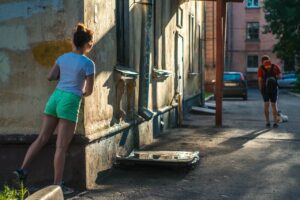A Reflection for the Third Sunday of Advent C
Readings: Zephaniah 3: 14-18a (RM) or 14-20 (RCL); Isaiah 12; Philippians 4: 4-7; Luke 3: 10-18 (RM) or 7-18 (RCL).
How desperate would you have to be, do you think, to ask someone you respect,
“What should I do? Tell me how to change my life, and I’ll do it.”
Most people would need to have hit absolute rock bottom with nowhere lower to fall, nothing left to lose, no shred of pride left. If you ever have the privilege of hearing a speaker at an open meeting of Alcoholics Anonymous, you will hear a level of rough honesty and wrenching self-understanding that emerged from that place at absolute rock-bottom.
It almost seems too easy in our Gospel reading for today. People from a variety of different life situations came to John the Baptist, a ragged bug-eating creature from the desert in Matthew’s telling, but here in Luke a prophet addressed with the title “Teacher.” They asked him,
“How should I change my life?”
My favourite is the advice he addresses to soldiers, which in one version reads,
“Stop grumbling and be content with your pay!”
You can just hear a curmudgeonly bark in his words.
John wasn’t the only “Baptist” plying his trade in the region at this time. The Hebrew prophets of several hundred years before, the era of defeat, exile and return, addressed themselves to the people as a whole. Their message ran something like,
“You want to know how this happened? Why you suffered slaughter and slavery, exile and oppression? Because you abandoned the God who brought your ancestors out of Egypt and thought you could do better with the local gods! And where did it get you? Huh?”
This was a call to repentance but addressed to the people as a whole, intended to bring them back, as a whole, to faithfulness to the God of their ancestors.
The prophets in the time of Jesus, on the other hand, were preaching individual responsibility for unethical, immoral or simply bratty behaviour. They preached, often to crowds, and dispensed advice, but didn’t stop there: they called those who intended to reform their lives to enter into the waters in a symbolic ritual act of washing away what was foul and rising up out of the water purified and renewed. This was not the sacrament of Baptism as we know it – the significance of a sacrament lies in the incarnation, death and resurrection of Christ. The word “baptizo,” pronounced “baptidzo,” in Greek, simply means, “to dip.”
And the process doesn’t stop there. Reform of one’s own life means living in community with others, compassionate and sensitive to their needs, and willing to let go of one’s own excess in order that others might enjoy the basic necessities.
It wouldn’t be prophetic without a future orientation and a threat of some sort:
“…but the chaff he will burn with unquenchable fire.”
Impending doom hardly qualifies as good news. And yet, behind all the threats and the dire predictions of cosmic collapse we’ve heard in the past few weeks’ readings, lies a silent glimmer of light. And sometimes much more than that.
This Sunday in Advent, the “pink candle Sunday” in your Advent wreath (unless you’re using the new Cosmic Advent Wreath, in which case your candle this week is red for the Incarnation), is marked by joyful anticipation. The first two readings set up this hopeful context: the reading from Zephaniah bubbles over with excitement and almost delirious joy over the people’s deliverance from oppression. The Psalm, this time not a real psalm but a passage from Isaiah 12, just bursts at the seams with exultation. Paul, writing to the community at Philippi, caps it off by urging them not only to “Rejoice!” but to trust in God with all their needs:
“but in everything, by prayer and petition with thanksgiving, make your requests known to God.”
Joy, trust, prayer, all enveloped with thanksgiving. It doesn’t get better than that.
In the Northern hemisphere we’re approaching the winter solstice – every afternoon a little darker, a little earlier. So we turn on the lights a little sooner, and appreciate the warmth of candlelight, or a string of fairy lights, or a fine crackling fire. The silent glimmer of light hovers, hinting, holding back just a little, until the time is right. And of all the symbolic features of this season of Advent, that of time overlays all the rest. Wait for God. Be strong. Take heart.
© Susan K. Roll
This is a revised version of the Reflection for December 12, 2021.
Susan Roll retired from the Faculty of Theology at Saint Paul University, Ottawa, in 2018, where she served as Director of the Sophia Research Centre. Her research and publications are centred in the fields of liturgy, sacraments, and feminist theology. She holds a Ph.D. from the Catholic University of Leuven (Louvain), Belgium, and has been involved with international academic societies in liturgy and theology, as well as university chaplaincy, Indigenous ministry and church reform projects.





Out of curiosity, I Googled your question: “What should I do? Tell me how to change my life, and I’ll do it.”
A whole page of “how to”, and a variety of time frames came up: from “immediately” to “six months”, to “14 days” to “90 days”.
What I take from this is that many of us ask the question. Some of us keep waiting for an answer that may be more palatable than the first one.
An additional piece of 12-step wisdom provides insight: “We thought we could find an easier, softer way, but we could not.” Rigorous honesty, and being “fearless and thorough from the very start” are also components of the question..